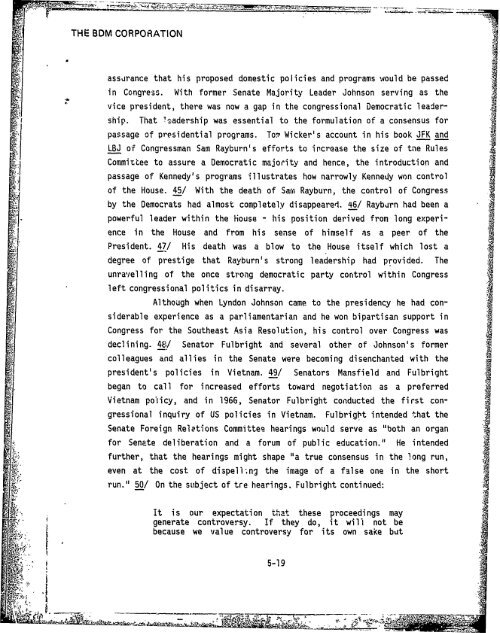policy - The Black Vault
policy - The Black Vault
policy - The Black Vault
You also want an ePaper? Increase the reach of your titles
YUMPU automatically turns print PDFs into web optimized ePapers that Google loves.
THE BDM CORPORATION<br />
assurance that his proposed domestic policies and programs would be passed<br />
in Congress. With former Senate Majority Leader Johnson serving as the<br />
vice president, there was now a gap in the congressional Democratic leadership.<br />
That 1-½adership was essential to the formulation of a consensus for<br />
passage of presidential programs. To-P Wicker's account in his book JFK and<br />
LBJ of Congressman Sam Rayburn's efforts to increase the size of tie Rules<br />
Committee to assure a Democratic majority and hence, the introduction and<br />
passage of Kennedy's programs illustrates how narrowly Kennedy won control<br />
of the House. 45/ With the death of Sami Rayburn, the control of Congress<br />
by the Democrats had almost completely disappeared. 46/ Rayburn had been a<br />
powerful leader within the House - his position derived from long experience<br />
in the House and from his sense of himself as a peer of the<br />
President. 47/ His death was a blow to the House itself which lost a<br />
degree of prestige that Rayburn's strong leadership had provided. <strong>The</strong><br />
unravelling of the once strong democratic party control within Congress<br />
left congressional politics in disarray.<br />
Although when Lyndon Johnson came to the presidency he had considerable<br />
experience as a parliamentarian and he won bipartisan support in<br />
Congress for the Southeast Asia Resolution, his control over Congress was<br />
declining. 4_8/ Senator Fulbright and several other of Johnson's former<br />
colleagues and allies in the Senate were becoming disenchanted with the<br />
president's policies in Vietnam. 49/ Senators Mansfield and Fulbright<br />
began to call for increased efforts toward negotiation as a preferred<br />
Vietnam <strong>policy</strong>, and in 1966, Senator Fulbright conducted the first congressional<br />
inquiry of US policies in Vietnam. Fulbriglht intended that the<br />
Senate Foreign Relations Committee hearings would serve as "both an organ<br />
for Senate deliberation and a forum of public education." He intended<br />
further, that the hearings might shape "a true consensus in the long run,<br />
even at the cost of dispelil.ng the image of a false one in the short<br />
"run." 50/ On the subject of tre hearings. Fulbright continued:<br />
It is our expectation Chat these proceedings may<br />
generate controversy. If they do, it will not be<br />
because we value controversy for its own sake but<br />
5-19<br />
"Mi
















